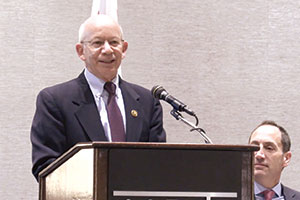Senior Reporter
Lawmakers Celebrate FAST Act, Say More Funding Still Needed

WASHINGTON — Congressional and state transportation leaders were patting one another’s back at a briefing here for their work twisting arms and shepherding passage of a $305 billion “historic” long-term highway bill known as the FAST Act.
“Thank you for your help,” Rep. Peter DeFazio (D-Ore.) told a gathering of members of the American Association of State Highway and Transportation Officials at the Feb. 24 briefing. “We can all congratulate ourselves, and we can take one brief moment.”
He paused. “We took our brief moment, so now we’re on to talking about sustainable funding.”
DeFazio told the group the challenge now is to find alternative revenue streams that could range from tolling to a vehicle miles traveled system that would supplement or even replace declining Highway Trust Fund revenues when the transportation law expires.
“I just want to propose to you to think out of the box,” DeFazio added.
The FAST Act, signed into law Dec. 18 by President Obama, is a fully paid-for reauthorization of federal highway, transit, highway safety, motor carrier safety, hazardous materials and passenger rail programs.
But there is no funding authorized after it expires.
Sen. Barbara Boxer (D-Calif.) also lauded AASHTO members for their work on what she called the longest-term transportation bill passed by Congress in 17 years.
“This is history, and you are part of it,” Boxer said. “This time around, everybody [in Congress] wanted to have a highway bill, but they feared how we would pay for it.”
Sen. Jim Inhofe (R-Okla.) said he and Boxer, who worked on the Senate version of the bill together, disagree on just about everything except transportation. They do agree on the need to get right to work on the future of highway funding.
“If we start preparing now, we’re going to be in a lot better shape,” Inhofe told AASHTO members. “If we don’t do that, then the closer it gets, we’re going to get into short-term extensions.”
“We still have an issue out there with funding,” Rep. Sam Graves (R-Mo.) said. “To be quite honest with you, some of the funding that was done was gimmickry, and we’ve got to come up with more of a long-term solution when it comes to putting dollars in the Highway Trust Fund. . . . Everything is on the table.
“We should come up with a solution within the next year or two to figure out how we move forward when it comes to the Highway Trust Fund,” Graves added.
Jeff Paniati, executive director of the Institute of Transportation Engineers, said he is pleased to see some certainty of funding for highway programs.
“But I have some concerns, though, about the long-term stability of the Highway Trust Fund,” Paniati told the group.
Peter Ruane, CEO of the American Road and Transportation Builders Association, said his group was grateful that the FAST Act was one of only a few large pieces of legislation that Congress passed last year.
“We’re not grateful that they sidestepped a major issue in our mind, which was a long-term recurring, reliable source of revenue to pay for the program,” Ruane said.

